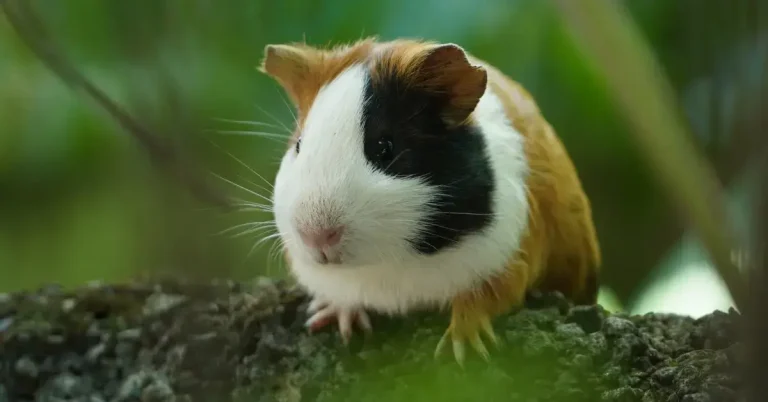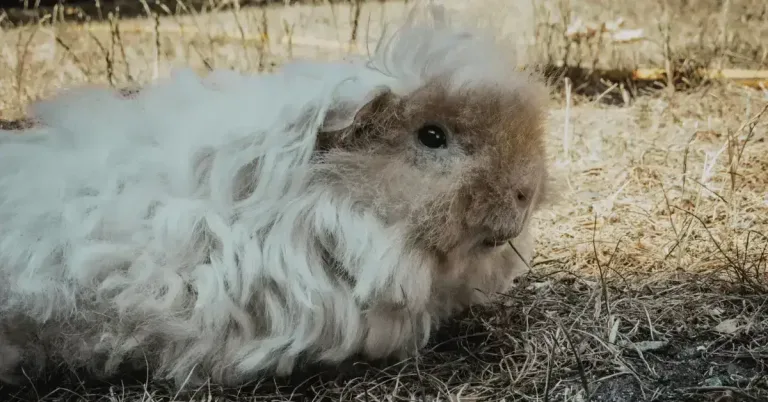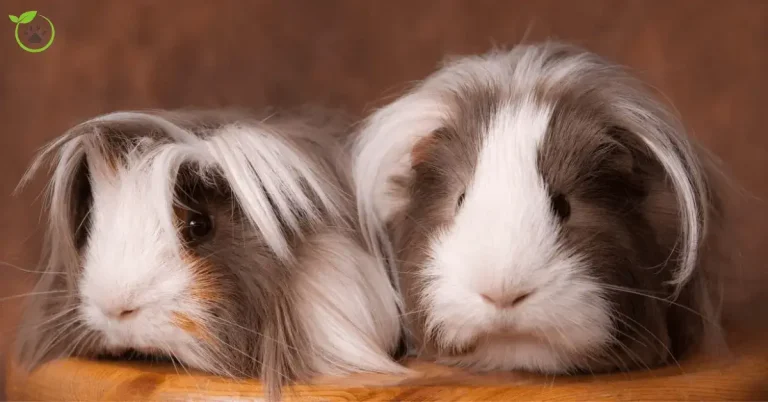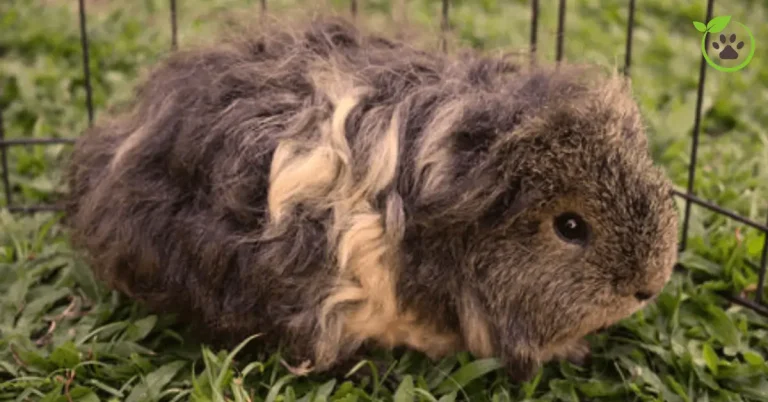Silkie Guinea Pig, also known as Shelties, are a popular breed in Australia, recognized for their attractive long hair. In the 1970s, people made Silkie Guinea Pigs by crossbreeding with Self American guinea pigs and Peruvian Guinea Pigs. While they are fancy and gentle, and taking care of their long hair can be a challenge. It’s essential to research and prepare for the care needs of this unique breed, as they require extra time and attention. Despite their higher maintenance, they are still as cute and loving as other guinea pig breeds.
Facts about the Silkie Guinea Pig
| Fur | Long, dense, straight |
| Size | 8–16 inches |
| Weight | 1–3 lbs |
| Lifespan | 5–7 years |
| Suitable for | Experienced owners, Families with small children |
| Temperament | Gentle, sociable |
| Common name | Silkie or Shelties |
| GROOMING | Regular hair grooming |
Silkie Guinea Pig Breed Physical Characteristics

Silkie guinea pigs have long, straight, silky hair that can reach up to 24 inches. Their hair flows back from their head and across their body and forms a teardrop shape when viewed from above. Silkies are similar to Peruvian guinea pigs but without spirals. Silkie guinea pigs can come in different colors such as white, black, red, brown, and gray, with various combinations of these colors in their coats. Unlike Peruvian guinea pigs, Silkie guinea pigs have soft, glossy, long hair that looks like a man and leaves their face exposed.
Silkie Guinea Pig Personality & Diet
Silkie guinea pigs have very calm and gentle personalities, making them suitable for children as pets. However, their high grooming needs require adult care. Like all other guinea pig breeds shelties Guinea Pig also need a constant supply of hay and water, pellets, and around a cup of fruits and vegetables to supplement other nutrients they need, such as vitamin C, calcium, and others. It’s important to take care of your guinea pig a balance diet for their good health.
Silkie Guinea Pigs Cost
This breed of guinea pig is very rare and challenging to find, but with some searching, you can locate them at pet stores and shelters. The cost of this breed is high due to their long, silky, and shiny fur, typically ranging between $20 and $30, but it may vary from place to place.
Silkie guinea Size Information
Silkie or Sheltieguinea pigs are of medium size, ranging from 8 to 16 inches in length and weight between 1 to 3 pounds.
Silkie Guinea Pig Care guide
Just like Peruvian guinea pigs, Silkie Guinea Pigs also need special care and attention due to their long, silky, and shiny hair.
Here we discuss some points:
Grooming
Due to their long, silky hairs, grooming these cavies is a difficult task than with other guinea pig breeds. However, you should be familiar with your pet’s grooming routine to bond with your pet and get to know each other. Silkies need professional grooming for their skin, nails, and hair’s well-being.
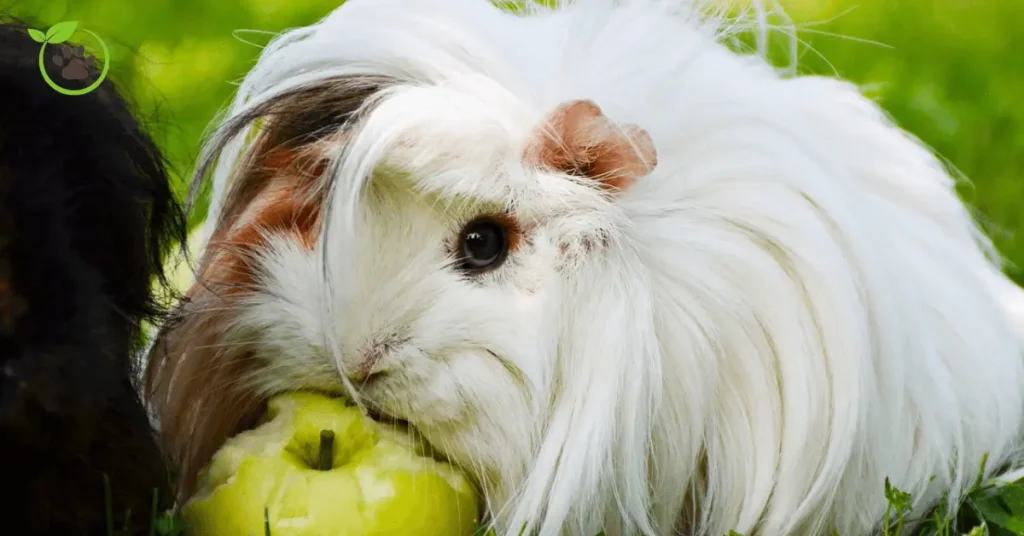
Diet: Provide a balanced diet rich in fresh vegetables, hay, and guinea pig pellets. Ensure they receive proper supply of vitamin C to maintain their health and coat quality.
Cage: Maintain a clean and spacious cage with bedding like hay. Change the bedding regularly to keep their living area fresh and to prevent health issues.
Socialization: Silkies are social animals. They enjoy the company of other guinea pigs, so consider having them in pairs or small groups of the same gender for companionship.
Clean Water: Always provide fresh and clean drinking water. Check their water supply daily to prevent health issues.
Check Health: Regularly examine your Silkie for signs of illness or discomfort. Pay attention to their eyes, nose, ears, and fur for any irregularity.
Ensure Safety: Keep your Silkie Guinea Pig in a safe and peaceful environment. They are small and unsafe to larger pets, so ensure their safety at all times.
Exercise: Allow them time to exercise in a secure and supervised area outside their cage.
Temperature: Silkies are sensitive to extreme temperatures. Keep them in a stable and comfortable environment, away from direct sunlight.
Veterinary Care: Regularly visit a veterinary that specializes in guinea pig breeds for check-ups and vaccinations. Guinea pigs, including Silkies, can develop health issues that require professional care.
You have to remember that caring for a Silkie Guinea Pig can be rewarding, but it comes with a commitment to their unique needs, especially their grooming requirements. With proper care, your Silkie will remain a stylish and healthy member of your family.
Common Health Concerns for Silkie Guinea Pigs
The Silkie guinea pig is a well-known breed of guinea pig known for its silky long hair and friendly nature. This guinea pig breed is susceptible to various diseases, like all other guinea pigs, that discussed below:
Dental Issues:
Guinea pigs have continuously growing teeth, and sometimes they experience dental issues like teeth growing too long or not aligning correctly. These problems can make it difficult for them to eat and require regular dental treatment.
Respiratory Infections:
Respiratory infection is a common disease in guinea pigs, and like all other guinea pigs, Silkie Guinea Pigs can also have this problem. This infection can be caused by various factors such as bacteria, viruses, or environmental conditions. If you notice symptoms like sneezing, coughing, nasal discharge, crackling sounds when breathing, reduced activity, weight loss, or watery eyes, then you must consult your pet doctor because your pet may be at risk due to this disease.

You can prevent respiratory infections in your guinea pig by following these tips:
- Maintain a clean and well-ventilated living environment for your guinea pig.
- Keep them away from smoke or harmful fumes.
- Prevent them from coming into contact with already infected guinea pigs.
- Consult a veterinarian if you notice any symptoms.
- Provide them with a warm and quiet place to rest.
- Ensure they have a spacious cage where they can move easily.
Urinary Issues in Guinea Pigs:
Guinea pigs can develop urinary tract infections due to bacterial infections. If you notice symptoms such as blood in the urine, difficulty urinating, frequent urination, and discomfort, your guinea pig may be suffering from a urinary infection. This infection is often caused by a deficiency of important dietary factors, such as vitamin C, and an excess of fiber in their diet. Maintaining a balanced diet that includes vitamin C and an appropriate level of fiber can prevent these problems in your guinea pig. Ensure that your guinea pig has access to fresh water, as staying hydrated can help prevent urinary issues. Make sure your pig’s diet includes fresh vegetables, as this can also help prevent urinary problems.
Deficiency of Vitamin C:
The deficiency of vitamin C in guinea pigs is another health factor. Like all other animals, including humans, guinea pigs require vitamin C, but they cannot produce it on their own. They need to obtain it from external sources, and they require more of it as they get older. To help your guinea pig live longer and prevent health problems caused by a lack of vitamin C, you must take care of their diet by providing a balanced amount of this essential vitamin.
Skin and Hair Problems:
Guinea pigs are lovely creatures created by God. However, due to their sensitive nature, they are prone to various health issues. In Silkie guinea pigs, skin and health problems are common because of their long and silky hair. If you don’t take proper care of them and their hair, they can develop bacterial infections and other issues that can lead to skin and health problems. You can prevent these issues by keeping them in a clean and well-maintained environment and regularly cleaning their cage.
Reproductive Problems:
Female Silkies may experience reproductive problems like pregnancy complications, and birthing issues. To prevent these problems, a veterinarian may recommend neutering or spaying during their pregnancy.
Heart Problems:
Some guinea pigs, including Silkies, can develop heart issues, especially as they age. Signs of heart problems may include rapid breathing, lethargy, and fluid retention.
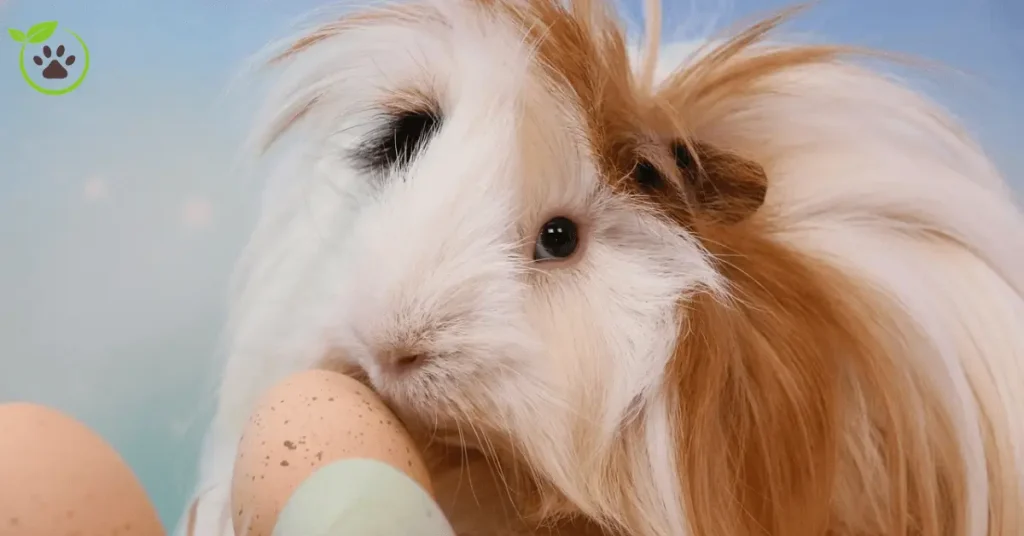
Lifespan silkie guinea Pig
Silkie guinea pigs typically have a lifespan of 5 to 7 years, but with proper care including a balanced diet, a clean environment, and the right amount of vitamin C, fresh water, and vegetables some can live even longer.
Silkie guinea Pig cage size
The size of a guinea pigs cage is important for their well-being and comfort. Guinea pigs need maximum space to move around, exercise, and engage in natural behaviors. The recommended minimum cage size for a pair of guinea pigs is typically 7.5 to 10.5 square feet but more space is always better. Make sure that the cage is well-ventilated, kept clean, and furnished with hiding spots, bedding, and items for mental stimulation.
Pros and cons
| Pros | cons |
| Adorable Appearance | High Maintenance Grooming |
| Friendly and Docile | Susceptible to Health Issues |
| Interactive | Special Diet Needs |
| Low Noise Level | Space Requirements |
| Long Lifespan | Social Animals |
FAQ’s
What is a Silkie Guinea Pig?
A Silkie Guinea Pig, also known as a Sheltie Guinea Pig, is a breed of guinea pig known for its long, silky, and often wavy or curly hair. They are popular pets due to their unique appearance.
2. What is the lifespan of a Silkie Guinea Pig?
Silkie Guinea Pigs typically have a lifespan of 5 to 7 years, although with proper care, some can live even longer.
3. Are Silkie Guinea Pigs good pets for children?
Yes, Silkie Guinea Pigs are generally known for their friendly and gentle nature, making them suitable pets for families, including children. However, adult supervision is important to ensure proper handling.
4. How do I groom a Silkie Guinea Pig?
Grooming Silkie Guinea Pigs is essential due to their long hair. Regular brushing is necessary to prevent matting and tangling. Use a soft brush or comb designed for guinea pigs, and be gentle to avoid hurting them.
5. What is the recommended diet for Silkie Guinea Pigs?
Silkie Guinea Pigs need a diet that includes fresh vegetables (especially those high in vitamin C), quality hay, and guinea pig pellets. They also require a source of vitamin C since they cannot produce it themselves.
6. Can Silkie Guinea Pigs live alone?
Guinea pigs are social animals, and it’s recommended to keep them in pairs or groups for companionship. While Silkie Guinea Pigs can live alone, they may become lonely and bored without a companion.


